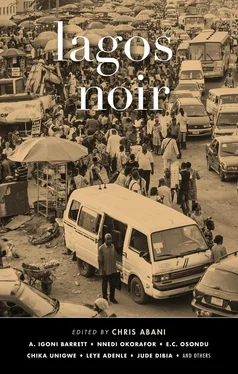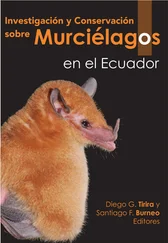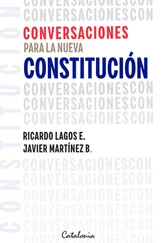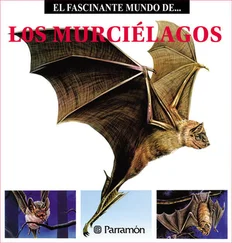Ннеди Окорафор - Lagos Noir
Здесь есть возможность читать онлайн «Ннеди Окорафор - Lagos Noir» весь текст электронной книги совершенно бесплатно (целиком полную версию без сокращений). В некоторых случаях можно слушать аудио, скачать через торрент в формате fb2 и присутствует краткое содержание. Город: New York, Год выпуска: 2018, ISBN: 2018, Издательство: Akashic Books, Жанр: Детектив, на английском языке. Описание произведения, (предисловие) а так же отзывы посетителей доступны на портале библиотеки ЛибКат.
- Название:Lagos Noir
- Автор:
- Издательство:Akashic Books
- Жанр:
- Год:2018
- Город:New York
- ISBN:978-1-61775-523-1
- Рейтинг книги:4 / 5. Голосов: 1
-
Избранное:Добавить в избранное
- Отзывы:
-
Ваша оценка:
- 80
- 1
- 2
- 3
- 4
- 5
Lagos Noir: краткое содержание, описание и аннотация
Предлагаем к чтению аннотацию, описание, краткое содержание или предисловие (зависит от того, что написал сам автор книги «Lagos Noir»). Если вы не нашли необходимую информацию о книге — напишите в комментариях, мы постараемся отыскать её.
Lagos Noir — читать онлайн бесплатно полную книгу (весь текст) целиком
Ниже представлен текст книги, разбитый по страницам. Система сохранения места последней прочитанной страницы, позволяет с удобством читать онлайн бесплатно книгу «Lagos Noir», без необходимости каждый раз заново искать на чём Вы остановились. Поставьте закладку, и сможете в любой момент перейти на страницу, на которой закончили чтение.
Интервал:
Закладка:
One counterweight to his euphoria at finding a worthy house he could borrow money to afford was the rush-hour traffic he would encounter two times a day on the commute between Egbeda and Surulere. Another was the hike in his transport costs, not caused by recurrent fuel scarcity, but due to the farther distance between home and workplace. A third drawback, perhaps, for this Surulere wannabe was the strangeness of Egbeda’s market-town character. The noise, the clash of smells, the cram of all types of peddlers and all sorts of stores: Egbeda had everything Surulere didn’t want. The man wanted everything Surulere had. But since the one thing he wanted more than anything else was in Egbeda, he swatted his doubts aside, and ignored the questions plucking at his subconscious about the cheapness of the two-bedroom, about why such a first-rate property had remained empty so long that the dead gecko on the kitchen counter had almost crumbled into dust. When the agent’s selling voice declared that a bunch of people were lined up to steal his luck if he didn’t seal the deal that day, the man broke his silence, confirmed he would take the house, and followed the agent into the landlady’s ground-floor apartment to endure her putrid stench for the second of many times to come.
6
The man’s house hunting led him to Egbeda out of necessity rather than choice. First he looked in Surulere, as he worked there, but also because he had lived there long enough to grow blind to its ugly side. It helped as well that Surulere, unlike many newer districts of Lagos, was connected to the public waterworks. Power supply, too, appeared steadier in Surulere than anywhere else he had slept in the city. As for garbage collection on his street, it was provided by private contractors for anyone who paid their fees, and the stink-bomb trucks arrived every Thursday — even in the rainy season when flash floods swept away roads across the swampland of Lagos, but left his street intact because it was tarred. Public facilities still existed in Surulere, albeit in an enfeebled state, and despite its high cost of housing and its teeming rat population, the man believed the devil he knew was his best chance of finding paradise.
Thus he trudged the familiar streets after work and on Sundays, searching with a stranger’s gaze for chalked signboards announcing miniflat vacancies, or one-bedroom apartments for rent, even single rooms to let, all of which he found he couldn’t afford. Yet he kept on looking for any place that would accept his life savings of N200,000; he searched, and pleaded, and tried, and tried again. He sought out the landlords of those single rooms closest to his budget to beg that they accept six months’ rent in lieu of the customary two years up front. Weeks of trying that path only confirmed there was no hope there, especially for a citizen who was seen an outsider by the Yoruba landowners. The man changed tactics: he knocked on the gates of houses along the genteel axis of Adelabu Road, Ogunlana Drive, and Adeniran Ogunsanya Street to ask the tenants if they would consider subleasing their unused gatehouses and boy’s quarters. When this route only succeeded in proving how afraid of strangers Lagosians are, he tried again by ingratiating himself to the construction workers toiling at building sites (he bought them bags of ice-cold pure water, a bribe worth more than cash under the lash of the afternoon sun) before plying them with questions about the architect’s plan — all these efforts undertaken for information, for an early look-see, for a fighting chance of slipping his foot in the doorway before the arrival of those procurers whose business cards bore the title of housing agent.
He only gave up on Surulere after he realized that rival salesmen in a seller’s market are always members of a secret society of mutual benefit. It seemed every single one of the local brotherhood of housing agents knew him either by sight or reputation, and when these men began to ignore his phone calls or greet his appearance at their dingy offices with expressions of weary disdain, he expanded his search to nearby Mushin and Oshodi. But even in these hardscrabble districts his budget remained as much an obstacle as his ambitions. A man who couldn’t raise more than N210,000 and yet insisted on his right to amenities like kitchen plumbing, an indoor toilet, and, in the curious case of the hole-in-the-wall room he inspected on a dirt road that straddled the boundary between Oshodi and Agege, windows wide enough to escape through in case of fire. Agent after agent turned him away upon becoming convinced that he was pickier than was acceptable in a Nigerian. The few who pitied him enough to show him the slum shacks befitting his pocket were afterward outraged at his lack of appreciation. He would rather be homeless than waste his money on those rat and cockroach playgrounds in face-me-I-face-you houses, he said. Life in Lagos was dangerous enough without sleeping in those hovels that turned into gas chambers once the I-pass-my-neighbor generators came on, he told them. When one of these 10 percent — chasing agents began reproaching him about being too proud for a poor man, he riposted: “Yes, I agree, but how is that a bad thing?”
7
Eight hundred years later, when the history of Eko is taught to our children, they will never understand why we did what we did. Their teachers will try to explain: Those were strange times in Lagos; everybody was a criminal. This textbook opinion, unwarranted though it may seem now, will nevertheless be reinforced throughout their childhood with stories and images in twenty-ninth-century multimedia. This is the truth we are not yet able to see in twenty-first-century Egbeda: a typical Lagos neighborhood — the air poisoned by generator fumes, the treeless landscape strewn with plastic trash, the waterways turned into festering sewers — so crowded with government-forsaken people and makeshift infrastructure that it is already under threat of being expunged from the urban planning models. Ikoyi and Surulere, the former more affluent and the latter middle class, are two sides of the past face of Lagos. Traffic-jammed Ikeja and flood-prone Lekki are likewise two extremes of the city’s present face; while the seaside facade of Eko Atlantic City is the future that Lagos is waterskiing toward. Thus Egbeda, like several other haphazard Lagos districts, is stuck in the perilous place of having no past glory, no present amenities, and no future plans. We would feel sorry for the residents who live with this foreboding, who leave their homes every sunrise with the nagging dread that this might be the day the bulldozers come and their neighborhood goes. We would feel sorry if we didn’t already know that most of them, the residents of Egbeda, like everyone else in Lagos who litters plastic bags and leaves their tungsten lightbulbs burning in daylight hours, is complicit in the crime of destroying our mother planet.
8
The man almost didn’t go to see the house in Egbeda. This was partly due to the agent but mainly because he had never been to that section of the city in his time in Lagos, and so all he knew about it was what he’d heard about the endless traffic jams of vehicles and people. He found out about the vacancy from the agent, who led him to the outsized birdhouse masquerading as a human habitation in the no-man’s-land between Oshodi and Agege. That disappointment colored the man’s perception of everything the agent promised afterward. Which was why, when the agent snapped his fingers in a feigned eureka and began spieling on about another perfect place in far-off Egbeda, the man responded by laughing in his face long enough to hurt his feelings. The agent shut up and showed the man two other places around Oshodi, neither of which even deserved excuses for turning them down. When the man remarked on the agent’s lack of enthusiasm for what he was selling, the rejoinder was a furious accusation about those who have ears not hearing and eyes refusing to see. This outburst ended with the agent swearing on his grandmother’s grave about the oh-so-rightness of the two-bedroom upstairs apartment that was a giveaway at N220,000 for a year’s rent, excluding the agent’s fee. Faced with the choice of finding another agent to start looking all over again, the man decided the better path was the high road of pacifying this charlatan into discharging his duties with some modicum of goodwill. That’s why he agreed to see the house in Egbeda.
Читать дальшеИнтервал:
Закладка:
Похожие книги на «Lagos Noir»
Представляем Вашему вниманию похожие книги на «Lagos Noir» списком для выбора. Мы отобрали схожую по названию и смыслу литературу в надежде предоставить читателям больше вариантов отыскать новые, интересные, ещё непрочитанные произведения.
Обсуждение, отзывы о книге «Lagos Noir» и просто собственные мнения читателей. Оставьте ваши комментарии, напишите, что Вы думаете о произведении, его смысле или главных героях. Укажите что конкретно понравилось, а что нет, и почему Вы так считаете.




![Ннеди Окорафор - Бинти [litres]](/books/399229/nnedi-okorafor-binti-litres-thumb.webp)
![Ннеди Окорафор - Кто боится смерти [litres]](/books/401080/nnedi-okorafor-kto-boitsya-smerti-litres-thumb.webp)






